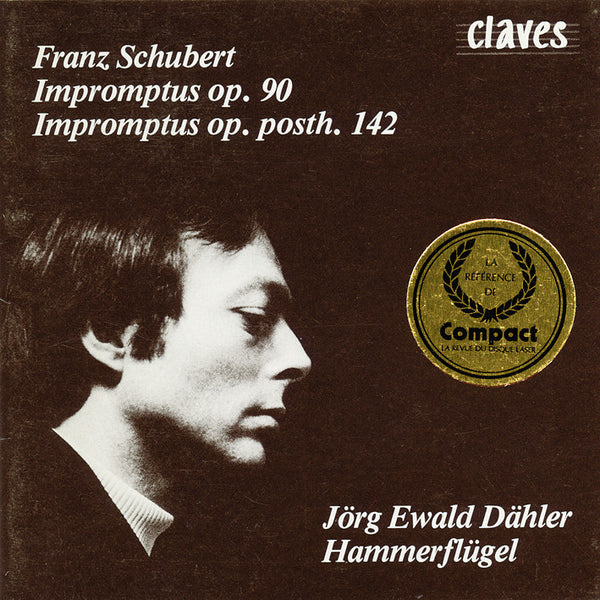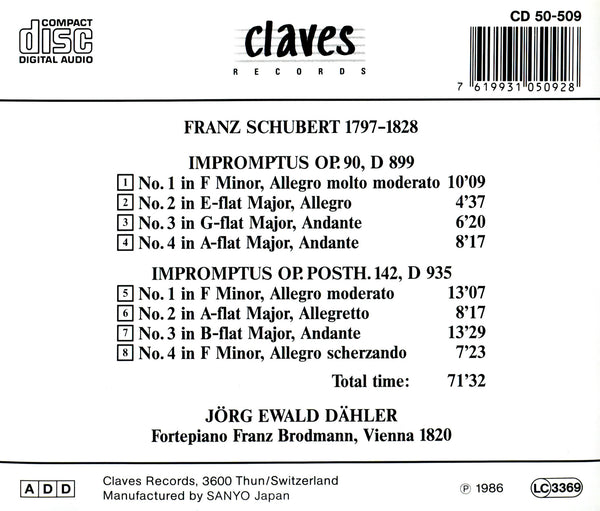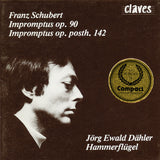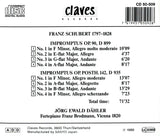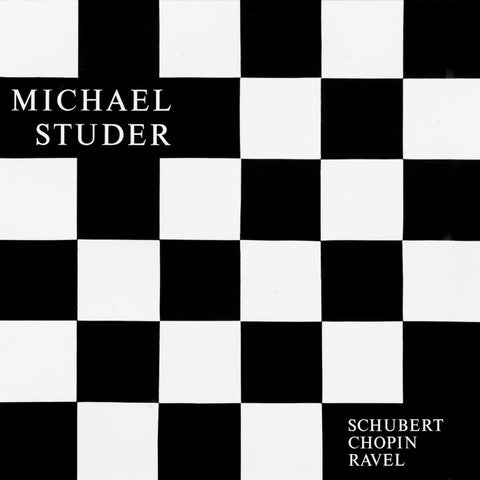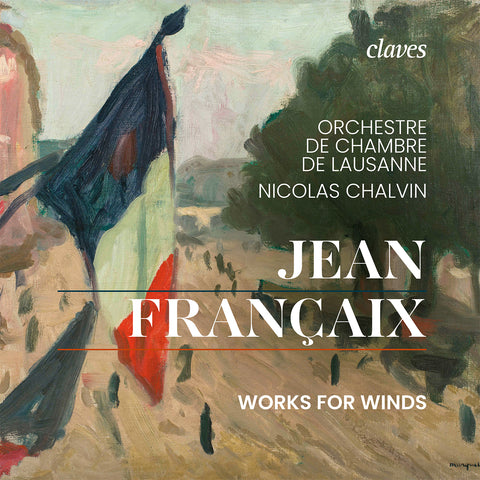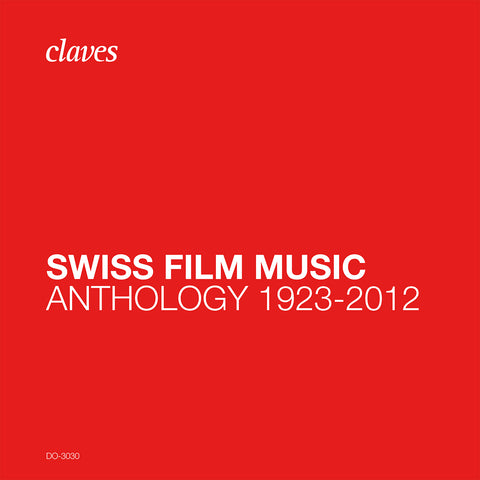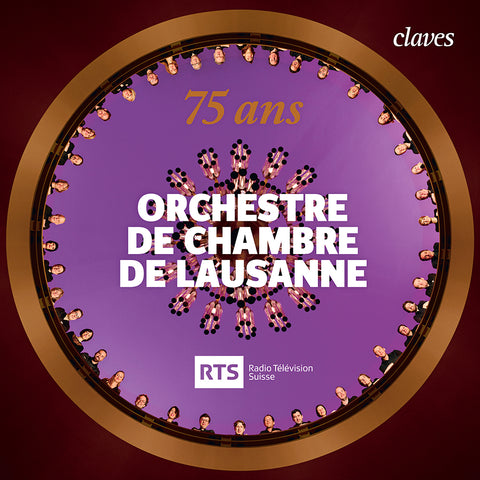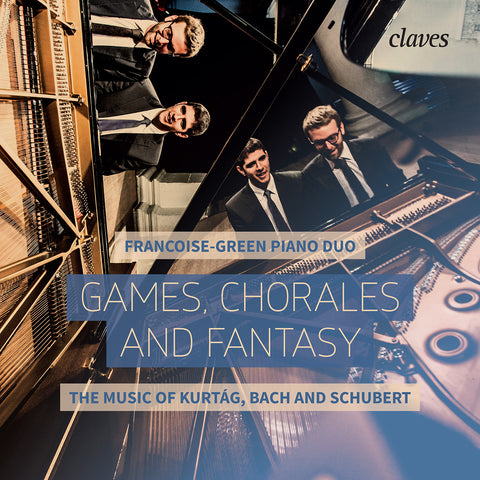(1986) Schubert: Impromptus
Category(ies): Piano
Instrument(s): Piano
Main Composer: Franz Schubert
CD set: 1
Catalog N°:
CD 0509
Release: 1986
EAN/UPC: 7619931050928
- UPC: 829410602464
This album is now on repressing. Pre-order it at a special price now.
CHF 18.50
This album is no longer available on CD.
This album has not been released yet. Pre-order it from now.
CHF 18.50
This album is no longer available on CD.
This album is no longer available on CD.
VAT included for Switzerland & UE
Free shipping
This album is now on repressing. Pre-order it at a special price now.
CHF 18.50
This album is no longer available on CD.
This album has not been released yet.
Pre-order it at a special price now.
CHF 18.50
This album is no longer available on CD.
This album is no longer available on CD.
NEW: Purchases are now made in the currency of your country. Change country here or at checkout
SCHUBERT: IMPROMPTUS
With these eight pieces Schubert creates a new genre of piano music (only comparable in its significance to Mendelssohn’s songs without words).
Indeed, some predecessors of the lyrical piano piece are to be found in Czechoslovakian music, but it is Schubert’s so-called Impromptu which becomes the most popular example of this genre. The term Impromptu meaning something which is always at hand (from the Latin in prompt esse) was not at all Schubert’s invention: the Viennese publisher Tobias Haslinger chose it as title for the four pieces op. 90 which Schubert wanted to be published either as single pieces or as cycle.
But Haslinger did not risk bringing out more than two of the four pieces during Schubert’s lifetime. Having completed the second series at the end of 1827, Schubert accepts the publisher’s title, at least we do not know of any objections made by the composer. The Impromptus op. 142, definitely more sophisticated in character than op. 90, were refused by Schott, the German publisher, saying: ‘Whenever you compose something lighter an yet equally brilliant in easier key, please, just send it to me…’
So these pieces opening a great many aspects to the future of piano playing were completely misunderstood at that time, although Schubert probably wanted to please the publishers and the public with these two series of Impromptus, trying to writh in a brilliant but easy manner by abandoning the more intellectual sonata form.
With the exception, by the way, of op.142 no. 1, Schubert uses various types of less complicated but rather refined song-like forms. To Robert Schumann the four Impromptus op. 142 appeared so compellingly connected to each other that he insisted on considering them as a four movement sonata.
English version Noëlle Schoeffter
(1986) Schubert: Impromptus - CD 0509
With these eight pieces Schubert creates a new genre of piano music (only comparable in its significance to Mendelssohn’s songs without words).
Indeed, some predecessors of the lyrical piano piece are to be found in Czechoslovakian music, but it is Schubert’s so-called Impromptu which becomes the most popular example of this genre. The term Impromptu meaning something which is always at hand (from the Latin in prompt esse) was not at all Schubert’s invention: the Viennese publisher Tobias Haslinger chose it as title for the four pieces op. 90 which Schubert wanted to be published either as single pieces or as cycle.
But Haslinger did not risk bringing out more than two of the four pieces during Schubert’s lifetime. Having completed the second series at the end of 1827, Schubert accepts the publisher’s title, at least we do not know of any objections made by the composer. The Impromptus op. 142, definitely more sophisticated in character than op. 90, were refused by Schott, the German publisher, saying: ‘Whenever you compose something lighter an yet equally brilliant in easier key, please, just send it to me…’
So these pieces opening a great many aspects to the future of piano playing were completely misunderstood at that time, although Schubert probably wanted to please the publishers and the public with these two series of Impromptus, trying to writh in a brilliant but easy manner by abandoning the more intellectual sonata form.
With the exception, by the way, of op.142 no. 1, Schubert uses various types of less complicated but rather refined song-like forms. To Robert Schumann the four Impromptus op. 142 appeared so compellingly connected to each other that he insisted on considering them as a four movement sonata.
English version Noëlle Schoeffter
Return to the album | Composer(s): Franz Schubert | Main Artist: Jörg Ewald Dähler







